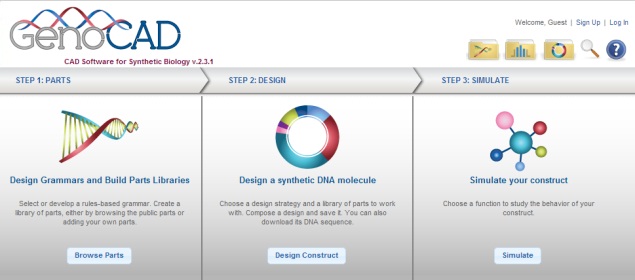New 'GenoCAD' modelling helping design synthetic biological systems

Known as 'GenoCAD', the open-source software would help synthetic biologists capture biological rules to engineer organisms that produce useful products or health-care solutions from inexpensive, renewable materials.
"Just like software engineers need different languages like HTML, SQL or Java to develop different kinds of software applications, synthetic biologists need languages for different biological applications," explained Jean Peccoud, an associate professor at the Virginia Bioinformatics Institute. From its inception, we envisioned GenoCAD as a framework allowing users to capture their expertise of a particular domain in languages that they could use themselves or share with others," he added.
GenoCAD would also help researchers design protein expression vectors, artificial gene networks and other genetic constructs - essentially combining engineering approaches with biology, said scientists from Virginia Bioinformatics Institute at Virginia Tech and the Massachusetts Institute of Technology (MIT).
Synthetic biologists have an increasingly large library of naturally derived and synthetic parts at their disposal to design and build living systems.
These parts are the words of a DNA language and the 'grammar' a set of design rules governing the language.
It has to be expressive enough to allow scientists to generate a broad range of constructs, but it has to be focused enough to limit the possibilities of designing faulty constructs.
The researchers said encapsulating current knowledge by defining standards would become increasingly important as the number and complexity of components engineered by synthetic biologists increases.
"Developing a grammar in GenoCAD is a little like writing a review paper," said Oliver Purcell, a postdoctoral associate at MIT.
"You start with the headings and you progressively dig deeper in the details. At the end of the process, you have a much better appreciation for what you know and what you don't know about a particular domain," he added.
"GenoCAD can enable collaborations across disciplines and institutions to foster a team approach to today's most pressing scientific challenges," the researchers said in the research published in the journal Bioinformatics.
Catch the latest from the Consumer Electronics Show on Gadgets 360, at our CES 2026 hub.
Related Stories
- Samsung Galaxy Unpacked 2025
- ChatGPT
- Redmi Note 14 Pro+
- iPhone 16
- Apple Vision Pro
- Oneplus 12
- OnePlus Nord CE 3 Lite 5G
- iPhone 13
- Xiaomi 14 Pro
- Oppo Find N3
- Tecno Spark Go (2023)
- Realme V30
- Best Phones Under 25000
- Samsung Galaxy S24 Series
- Cryptocurrency
- iQoo 12
- Samsung Galaxy S24 Ultra
- Giottus
- Samsung Galaxy Z Flip 5
- Apple 'Scary Fast'
- Housefull 5
- GoPro Hero 12 Black Review
- Invincible Season 2
- JioGlass
- HD Ready TV
- Laptop Under 50000
- Smartwatch Under 10000
- Latest Mobile Phones
- Compare Phones
- OPPO Reno 15 FS
- Red Magic 11 Air
- Honor Magic 8 RSR Porsche Design
- Honor Magic 8 Pro Air
- Infinix Note Edge
- Lava Blaze Duo 3
- Tecno Spark Go 3
- iQOO Z11 Turbo
- Lenovo Yoga Slim 7x (2025)
- Lenovo Yoga Slim 7a
- Lenovo Idea Tab Plus
- Realme Pad 3
- Moto Watch
- Garmin Quatix 8 Pro
- Haier H5E Series
- Acerpure Nitro Z Series 100-inch QLED TV
- Asus ROG Ally
- Nintendo Switch Lite
- Haier 1.6 Ton 5 Star Inverter Split AC (HSU19G-MZAID5BN-INV)
- Haier 1.6 Ton 5 Star Inverter Split AC (HSU19G-MZAIM5BN-INV)







![[Sponsored] Haier C90 OLED TV | Dolby Vision IQ, 144Hz OLED and Google TV in Action](https://www.gadgets360.com/static/mobile/images/spacer.png)









